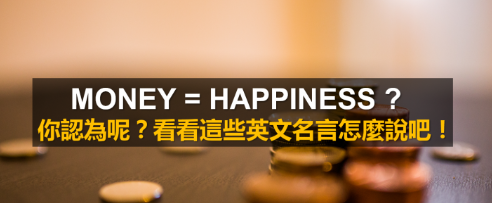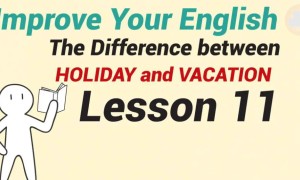金钱买不到幸福 (money can’t buy happiness)
“Happiness resides not in possessions, and not in gold, happiness dwells in the soul.” And, “By desiring little, a poor man makes himself rich.” — Democritus
「幸福并不存在于财产中,也不在于黄金里,幸福源自于灵魂中。」、「只要别无所求,一个贫穷的人也能让自己很富有。」 —— 德谟克利特
*延伸*
reside (v.) 存在于。也可以解释为「住在」(某处),意思相当于 live in。
She resides in Florida, with her family.
她和家人居住于佛罗里达州。
possessions (n.) 财富;所拥有的人事物
Possessions of drugs is illegal.
持有毒品是违法的。
dwells (v.)源自于;存在;居住于 (某处)
The problem dwells in social injustices.
这问题源自于这个社会不公。
soul (n.) 灵魂
I’m looking for a soulmate to share my dreams.
我正在寻找能够分享梦想的心灵伴侣。
“Money has never made man happy, nor will it, there is nothing in its nature to produce happiness. The more of it one has, the more one wants.” — Benjamin Franklin
「金钱从未、也不可能会让一个人幸福,没有任何事物是能够制造幸福的。人拥有的越多,欲望也越多。」 —— 班杰明·富兰克林

*延伸*
produce (v.) 产生
That company produces the best car in the country.
那家公司生产的汽车是全国最好的。
“Happiness is not in the mere possession of money; it lies in the joy of achievement, in the thrill of creative effort.” — President Franklin D. Roosevelt
「幸福不是拥有金钱而已;它徜徉于成就事物的快感与创意中的激情。」 —— 富兰克林·罗斯福
*延伸*
mere (a.) 仅仅
A mere 15 minutes later, they were sold out.
短短的 15 分钟后,它们就销售一空。
achievement (n.) 成就
His greatest achievement is having his own family.
他最大的成就是拥有了自己的家人。
金钱等于幸福 (money equals happiness)
“When I was young I thought that money was the most important thing in life; now that I am old, I know that it is.” And: “Anyone who lives within their means suffers from imagination.” — Oscar Wilde
「当我年轻的时候,我以为金钱是生命中最重要的事物;现今我老了,我了解到事情确实是如此。」;「任何只量力而为活着的人,都只是受苦于幻想中而已。」 —— 奥斯卡·王尔德
*延伸*
suffer (v.) 受苦
She suffered from excessive stress.
她为巨大的压力所苦。
imagination (n.) 幻想
That’s not true, it’s just imagination.
那不是真的,只是幻想而已。
“Wealth is the ability to truly experience life.” — Henry David Thoreau
「财富是体验人生不可或缺的一环。」 —— 亨利·大卫·梭罗
*延伸*
wealth (n.) 财富
He is the wealthiest person on earth.
他是世界上最富有的人。
experience (n.) 经验、(v.) 体验、经历
I’ve never experience this kind of situation.
我从未经历过这样的情况。
“There are people who have money, and there are people who are rich.” — Coco Chanel
「这世上存在着有钱的人,也存在着富有的人。」 —— 可可·香奈儿
这句话的前后文看似一样,但其实深富哲理呢!小编觉得香奈儿女士是认为有一类人单纯只是「拥有金钱」 (have money),但另一类是「富有」 (rich) ,也就是知道怎么使用这些金钱,比如花钱上课投资自己、捐赠财富帮助需要的人等等。
其他哲学上的分歧 (philosophical disagreement)
除了上面关于「有钱等于幸福」和「有钱不等于幸福」的名言,也有些人其实并没有下定论,让我们继续看下去吧!
“It’s a kind of spiritual snobbery that makes people think they can be happy without money.” — Albert Camus
「其实是精神上的力量,才让人们误以为没有金钱也可以很幸福。」 —— 阿尔贝·卡缪
*延伸*
spiritual (a.) 精神上的
He is our spiritual leader.
他是我们精神上的领袖。
snobbery (n.) 势利眼
Amy accused John of snobbery because he’s always trying to get to know members of his son’s private school.
John 因为不断想尽办法结识他儿子的私立学校中的成员,而被 Amy 称为势利眼。
“I’d like to live as a poor man with lots of money.” — Pablo Picasso
「我愿意身怀财富,但以穷人的模式活着。」 —— 巴勃罗·毕卡索
“Money is better than poverty, if only for financial reasons.” — Woody Allen
「若单从财务的角度上来说,有钱当然比贫困要好。」 —— 伍迪·艾伦
*延伸*
poverty (n.) 贫穷、贫困
Globalization is the solution to worldwide poverty.
全球化将会是解决贫困的不二法则。







